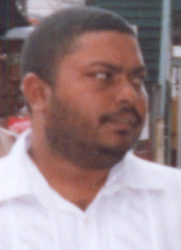Saying that a lack of resources to police the country’s borders was in part responsible for convicted drug trafficker Barry Dataram being able to flee before his sentencing, President David Granger yesterday also called for “a greater level of alertness” on the part of the magistracy in such cases.
Dataram fled before the guilty verdict was delivered in his trial for cocaine trafficking on Tuesday, when he was sentenced to five years in jail and fined a hefty sum in his absence.

Stabroek News has been unable to ascertain whether Dataram, who has been on the radar of both local and US authorities for years, had been under surveillance after being granted $3M bail by the High Court.
Asked yesterday during the recording of The Public Interest interview programme whether he viewed Dataram’s escape as a failure of local law enforcements agencies and what his government would be doing to locate the fugitive, President Granger said Dataram was not a Guyanese and was not travelling on a Guyanese passport. He further said that that local law enforcement does not possess the resources to monitor every kilometre of the country’s borders and ports.
He also explained that the Commissioner of Police has been instructed to liaise with neighbouring countries, including Suriname, where he is suspected to have gone, to locate him.
“My information is that he is not travelling on a Guyanese passport. So after his disappearance—and we weren’t aware of his disappearance—we continued to work with our partners in the Caribbean to bring him to justice. If he is in Suriname, as is suspected, the Commissioner of Police has been instructed to try to ascertain his whereabouts in neighbouring countries but he is not using a Guyana passport, that much we know,” the Head of State said.
“It is physically impossible to control every kilometre with our present resources. We are working on the acquisition of surveillance aircraft, we are placing mounted police in wide open areas, we are acquiring ATVs and surveillance equipment,” he added.
In an interview with Ministry of the Presidency staff after the recording, President Granger explained that as a “well known… person of interest,” Dataram’s escape was an error that should’ve been avoided.
“Mr. Dataram is a person of interest. He is a well-known character in Guyana and I would expect that even though the judicial branch is separate, there should be a greater level of alertness on the part of the magistracy, in the judiciary, in matters like this and I don’t regard it as a failing on the part of law enforcement agencies but it is definitely an error which ought to have been avoided,” he said.
He also stated that while Dataram might have a foreign passport, it might be a forged passport. Dataram’s official passport was seized before he was granted bail.
Dataram, his common-law wife Anjanie Boodnarine, Kevin Charran, and Trevor Gouveia were on trial Georgetown Magistrate Judy Latchman after they were charged with the possession of 129.230 kilograms of cocaine (equivalent to 284 pounds) found on April 16, 2015 at the Lot 661 Silver Dam, Fourth Avenue, Diamond Housing Scheme house rented by Dataram. Dataram was found guilty and fined $164M.
Earlier this year, Dataram, in an interview with HGPTV Channel 67’s Nightly News, had admitted to his involvement in the drug trade although at that time he was yet to have ever been convicted.
During the interview, Dataram, accused a high ranking Customs Anti-Narcotic Unit (CANU) official of being involved in the drug trade and added that the rank would take as much as $10 million to allow cocaine to leave the country. He also alleged that the majority of the drugs that is seized by CANU returns to the streets. He said that he knew of this because of his involvement and his friends’ involvement in the trade. “I know what is going on in the streets… I know what is going on in CANU… them is the enemies and they have to know that just like how they got things on me I get things on them,” he said.
His comments later prompted Granger to set up a Board of Inquiry to investigate the allegations, which found that the claims had no merit.




